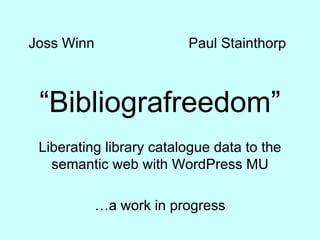Bibliografreedom
- 1. Joss Winn Paul Stainthorp âBibliografreedomâ Liberating library catalogue data to the semantic web with WordPress MU âĶa work in progress
- 2. Hello âĒ Joss Winn âĒ Technology Officer, University of Lincoln âĒ jwinn@lincoln.ac.uk âĒ http://joss.blogs.lincoln.ac.uk/ âĒ Twitter @josswinn âĒ Paul Stainthorp âĒ E-resources Librarian, University of Lincoln âĒ pstainthorp@lincoln.ac.uk âĒ http://blogs.library.lincoln.ac.uk/ âĒ Twitter @pstainthorp
- 3. The elements âĒ Source library catalogue(s) âĒ WordPress Multi-user (WPMU) âĒ Scriblio â example (Plymouth State Uni.) âĒ Site-wide tags â example (Uni. of Lincoln) âĒ Triplify output â example
- 4. Un The Semantic Web DF io n /R m Ca RDF N3 to t /A alo S gu RS e Triplify MySQL Managed on USERS (discovery / interaction) behalf of Scriblio (aggregated; site-wide) libraries Wordpress Multi-user (WPMU) Scriblio Scriblio Scriblio Managed by each library OPAC OPAC OPAC Library âAâ Library âBâ Library âCâ
- 5. Benefits âĒ A quick ânâ dirty Library 2.0 OPAC âĒ Easy incorporation of 3rd-party enhancements (Amazon etc.) âĒ A devolved Union Catalogue; each source catalogue managed by its owners âĒ The WordPress âecosystemâ âĒ Liberation of bibliographic data to the semantic web âĒ Then whatâĶ? What could you do with OPAC RDF data?
- 6. To-do list âĒ Scriblio is not very âatomicâ â âblobsâ of data not ideal for semantic web approach âĒ Scriblio project is still a bit ârawâ â better catalogue imports and documentation âĒ Triplify config file still needs customising to make the most of Scriblio âĒ Needs source material! Libraries willing to maintain a Scriblio version of their OPAC
- 7. Joss Winn ? Paul Stainthorp







